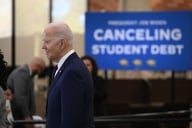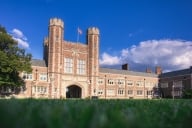You have /5 articles left.
Sign up for a free account or log in.
Students and pro-LGBT groups on and off campus are unhappy with the University of Utah for two reasons.
First, the university plans to award an honorary degree this week to Lynette Nielsen Gay, an entrepreneur and philanthropist who has worked with the groups Family Watch International and the World Congress of Families, which the Southern Poverty Law Center has labeled as anti-LGBT hate groups.
Second, after the university’s LGBT Resource Center raised concerns with the administration about Gay’s connection to those two groups, the university didn't change its plans, but did delete the references to Gay's involvement with the two groups from her bio on the university’s website.
“Honorary degrees are given for a number of reasons,” said C. Kai Medina-Martinez, director of the LGBT Resource Center. “To honor people’s work in humanitarian and social justice areas, to acknowledge what they’re doing. I think there should be an expectation that they hold the same mission as the University of Utah does,” which includes a commitment to inclusion and diversity, said Medina-Martinez.
The SPLC, on its website, calls the World Congress of Families “one of the key driving forces behind the U.S. Religious Right’s global export of homophobia and sexism.” The Human Rights Campaign linked the organization to the so-called kill the gays bill in Uganda and antigay legislation in various other countries. The organization has pushed back against the hate group designation, though plenty of other groups, including the Human Rights Campaign, have denounced its actions.
Family Watch International, according to its website, works in the United Nations and various countries to “preserve and promote the family, based on marriage between a man and a woman,” and it too appears on SPLC’s list of Active Anti-LGBT Groups for its "aggressive anti-LGBTQ, anti-choice" activism in the United Nations and around the world.
On whether or not the award ought to be given in the first place, Medina-Martinez (whose prefers the pronoun they) said, “That’s a really hard one. On the one hand I might say, yeah, they shouldn’t. On the other hand, I think there’s very honorary things this person has done, advancing health care in other countries.”
Gay, a former president of the Ghana West Africa Mission for the Church of Jesus Christ of Latter-day Saints, helped start Ensign College of Public Health in Ghana, according to her bio, in addition to similar work in a number of other African countries. She did not respond to requests relayed through the university to comment.
“Altering the bio makes it appear that the university is dishonest and trying to hide something,” Medina-Martinez said. “I don’t know what the goal was, but perception is hard to change … That piece concerns me -- that perception -- regardless of what the intent was.”
Others are much less conflicted about giving Gay an honorary degree. Students for a Democratic Society, a progressive student group on campus, is planning a rally on graduation day in protest of the move.
“Both of these organizations that she’s heavily involved in, they’re both anti-gay marriage, anti-LGBTQ, anti-abortions, and they promote these positions internationally,” said Theresa Nielson, the group’s president. “We think it’s preposterous for the university to be giving an award to Gay, because what does it say to LGBT students and what does it say about our campus?”
Nielson said her group also plans to ask graduates to turn their backs in protest as the award is given.
“The campus needs to use a more thorough vetting process in how it chooses to honor individuals with these degrees,” said Shane Windmeyer, executive director of Campus Pride. “It’s obvious that there was a mistake made in honoring an individual with an affiliation with an anti-LGBT organization of any kind. It flies in the face of what the University of Utah has been trying to do for a decade when it comes to LGBT inclusion.”
“The University of Utah has always been a campus community that has been a leader in the state of Utah and even in the Northwest when it comes to its LGBT office and center and its commitment to LGBT issues,” he said. “There should be serious consideration about whether or not this honorary degree should be awarded if at all to this individual.”
As of Friday, the university plans to move forward with the degree.
“Lynette Nielsen Gay is being recognized by the University of Utah with an honorary degree because of her important humanitarian efforts creating health, education and economic development programs in Africa,” the university said in a statement sent to Inside Higher Ed. “Ms. Gay is affiliated with two organizations whose involvement in anti-LGBTQ campaigns around the world does not reflect the values of the University of Utah. We heard concerns, and we removed the references because they were not part of the committee’s deliberations. We were concerned that by leaving them in, it suggested otherwise.”








